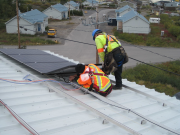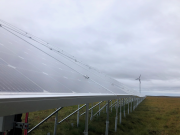The world’s transition to clean energy is creating opportunities for Indigenous people who have largely been left on the sidelines of power production and distribution.
In Canada, the First Nations, Métis, and Inuit are bringing traditional knowledge to the industry and relying, with increasing frequency, upon renewable technology to heat and light their communities. They are replacing diesel with wind and solar, and starting businesses that hold long-term promise for both the environment and local economies.
Four of the extraordinary women among the first group of 20 who were selected by the Pembina Institute and GLOBE Series to be profiled as part of the Women in Energy Transformation project are Indigenous. Their stories show that Indigenous women bring a much-needed perspective to addressing climate issues: one that considers social impacts and incorporates the deep knowledge of environmental stewardship held by Indigenous communities.
They are demanding that their voices be heard and that the prosperity of their people be prioritized as the world turns a page on fossil fuels.

Jordyn Burnouf: Economic opportunities must be brought to communities
Jordyn Burnouf is Advisor to the Vice President of the Métis Nation of Saskatchewan and a member of the Black Lake First Nation. She was raised in the Métis community of Île-à-la-Crosse in a region of northern Saskatchewan where there is heavy resource extraction. That early experience influenced her desire to bring an Indigenous worldview to the energy sector.
Today, Burnouf works with governments and non-profit organizations to create opportunities for Indigenous people in energy.
“The Indigenous people and the Indigenous worldview need to be prioritized in decision-making processes, and in any plan to address a just transition for energy,” says Burnouf, adding that she has witnessed environmental racism in the course of her work. She says it is time for that to change.
“There needs to be more opportunity for Indigenous people to have the skills training and support systems to execute some of these projects,” says Burnouf. “And we need the funds to be able to match what those projects could be.”

Melina Laboucan-Massimo: We must understand the burden we are placing on current and future generations in the energy sector
Melina Laboucan-Massimo is the founder of Sacred Earth Solar as well as the co-founder and Senior Director of Indigenous Climate Action. Melina is Lubicon Cree and was born in her community of Little Buffalo, Alberta. Melina’s childhood being surrounded by logging, oil and gas extraction propelled her work on environmental and climate change issues from a young age. Today, Sacred Earth Solar empowers Indigenous communities to implement renewable energy technologies.
Laboucan-Massimo says the only way that humans can survive on this planet is to respect their sacred connection to Mother Earth. “It's incredibly important to do the work for future generations, taking equity into account,” she says. “All people have the right to breathe clean air and drink clean water.”
As we move to renewables, Laboucan-Massimo says it is critical that the future energy system does not reproduce existing inequities, and that certain segments of society, namely Indigenous communities, should not be forced to carry the burden of shouldering negative impacts for all.
“I feel like a lot of Northern and remote communities located in and around extractive industries see and experience (the harnessing of energy) in a much different way than the rest of Canada does,” says Laboucan-Massimo.

Cloy-e-iis Judith Sayers: The time for change is now
But, even as Indigenous women express caution about the transition’s evolution, many are also anxious for change.
Judith Sayers was Chief of the Hupacasath First Nation in 2001 when her community began development of a hydropower project on the China Creek in British Columbia. That marked the start of the work that has made her a respected voice nationally in clean energy.
Sayers, the Chancellor of Vancouver Island University, is a past director of Clean Energy BC and has worked with many groups on environmental causes. She is impatient for change.
“I think the transition has got to happen a lot quicker than 2030 and 2050 if we want to get to zero emissions,” she says. “To get zero emissions, we should have started 20 years ago. I would like to see that being accelerated. In fact, I gave a presentation to the Senate on the Net-Zero Emissions Accountability Act and told them that you can't wait that long.”

Larissa Crawford: No climate action without climate justice
Speed is of the essence. But so is racial and climate justice.
For Larissa Crawford, the founder and managing director of Future Ancestors Services, there can be no sustainable climate action without climate justice - which requires a critical examination of how colonial legacies have shaped our truths and realities today. Crawford, who is of Métis and Jamaican descent, relied heavily on decolonial and Indigenized teachings when she laid down the principles that would guide her business.
Today, she works with governments and other clients to help them see the energy industry through the lens of anti-racism and accountability for the prosperity of future generations.
“The physical consequences of environment and climate change cannot be removed from the social and political implications and causes,” says Crawford. “Climate justice means that climate action done on any of the globe’s Indigenous lands must centre Indigenous peoples’ knowledge systems and sovereignty.”
Join the Pembina Institute and GLOBE Series on March 31st, 2022 for a session at GLOBE Forum focusing on the leadership and perspectives of Indigenous women on climate change and the energy transition in Canada. Register today.






